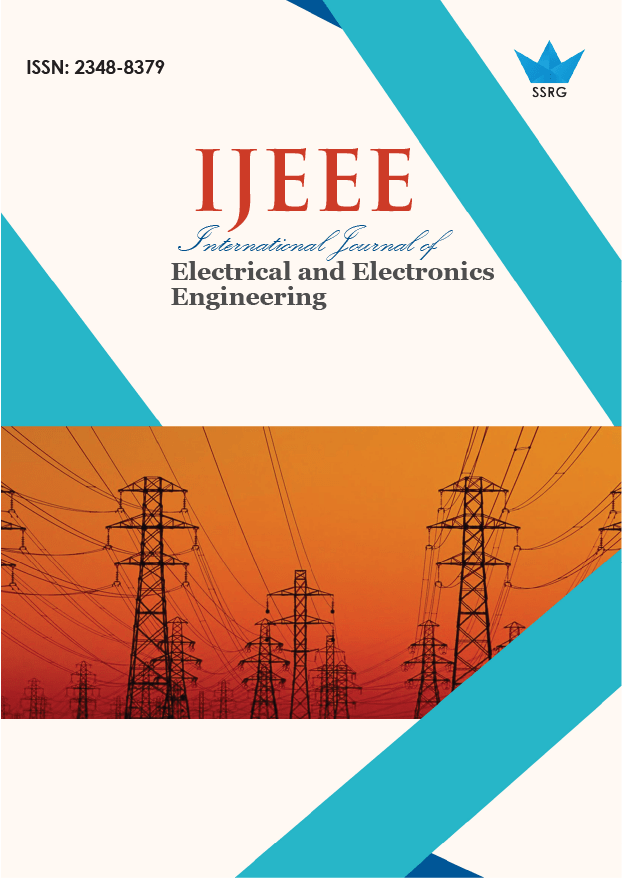Transforming Educational Outcomes with IoT: Opportunities and Challenges in Somalia

| International Journal of Electrical and Electronics Engineering |
| © 2024 by SSRG - IJEEE Journal |
| Volume 11 Issue 9 |
| Year of Publication : 2024 |
| Authors : Mohamed Abdirahman Elmi, Abdirahman Osman Hashi, Abdullahi Ahmed Abdirahman, Ubaid Mohamed Dahir, Octavio Ernest Romo Rodriguez |
How to Cite?
Mohamed Abdirahman Elmi, Abdirahman Osman Hashi, Abdullahi Ahmed Abdirahman, Ubaid Mohamed Dahir, Octavio Ernest Romo Rodriguez, "Transforming Educational Outcomes with IoT: Opportunities and Challenges in Somalia," SSRG International Journal of Electrical and Electronics Engineering, vol. 11, no. 9, pp. 186-195, 2024. Crossref, https://doi.org/10.14445/23488379/IJEEE-V11I9P116
Abstract:
This paper explores the transformative potential of the Internet of Things (IoT) in addressing the educational challenges in Somalia. With a focus on creating inclusive, interactive, and efficient learning environments, the study proposes a phased IoT model that includes infrastructure setup, deployment of IoT devices, remote learning integration, data collection and analysis, and training and capacity building. Each phase is meticulously designed to enhance educational outcomes by leveraging IoT technologies such as solar-powered systems, high-speed internet, interactive whiteboards, connected tablets, virtual classroom platforms, and performance monitoring software. Through survey responses and analysis, the paper identifies the benefits and challenges of implementing IoT in Somali education, emphasizing the need for reliable infrastructure, continuous training, and supportive policies. The findings underscore the significant potential of IoT to revolutionize education in Somalia, making it more accessible, engaging, and adaptive to the needs of diverse learners.
Keywords:
Internet of Things, Education technology, Smart classrooms, Remote learning, Educational innovation.
References:
[1] Anil Kumar et al., “Transforming Education through IoT and AI Opportunities and Challenges,” Educational Administration: Theory and Practice, vol. 30, no. 5, pp. 11610-11622, 2024.
[CrossRef] [Google Scholar] [Publisher Link]
[2] Nasfikur R. Khan et al., “Internet of Things-Based Educational Paradigm for Best Learning Outcomes,” 2022 International Conference on Advances in Computing, Communication and Applied Informatics (ACCAI), Chennai, India, pp. 1-8, 2022.
[CrossRef] [Google Scholar] [Publisher Link]
[3] Ashish Kumar Biswal et al., “Transformative Metamorphosis in Context to IoT in Education 4.0,” EAI Endorsed Transactions on Internet of Things, vol. 10, 2023.
[CrossRef] [Google Scholar] [Publisher Link]
[4] Esin Mukul, and Gulcin Buyukozkan, “Digital Transformation in Education: A Systematic Review of Education 4.0,” Technological Forecasting and Social Change, vol. 194, 2023.
[CrossRef] [Google Scholar] [Publisher Link]
[5] Rusen Meylani, “Transforming Education with the Internet of Things: A Journey into Smarter Learning Environments,” International Journal of Research in Education and Science, vol. 10, no. 1, pp. 161-178, 2024.
[CrossRef] [Google Scholar] [Publisher Link]
[6] Mostafa Al-Emran, Sohail Iqbal Malik, and Mohammed N. Al-Kabi, “A Survey of Internet of Things (IoT) in Education: Opportunities and Challenges,” Toward Social Internet of Things (SIoT): Enabling Technologies, Architectures and Applications,” pp. 197-209, 2019.
[CrossRef] [Google Scholar] [Publisher Link]
[7] Afzal Badshah et al., “Transforming Educational Institutions: Harnessing the Power of Internet of Things, Cloud, and Fog Computing,” Future Internet, vol. 15, no. 11, 2023.
[CrossRef] [Google Scholar] [Publisher Link]
[8] Marinela Mircea, Marian Stoica, and Bogdan Ghilic-Micu, “Investigating the Impact of the Internet of Things in Higher Education Environment,” IEEE Access, vol. 9, pp. 33396-33409, 2021.
[CrossRef] [Google Scholar] [Publisher Link]
[9] Hamid Doost Mohammadian, “IoT-Education Technologies as Solutions towards SMEs’ Educational Challenges and I4.0 Readiness,” 2020 IEEE Global Engineering Education Conference (EDUCON), Porto, Portugal, pp. 1674-1683, 2020.
[CrossRef] [Google Scholar] [Publisher Link]
[10] Sayeda Zain, “Digital Transformation Trends in Education,” Future Directions in Digital Information, pp. 223-234, 2021.
[CrossRef] [Google Scholar] [Publisher Link]
[11] Mohamad Kassab, Joanna DeFranco, and Phillip Laplante, “A Systematic Literature Review on Internet of Things in Education: Benefits and Challenges,” Journal of Computer Assisted Learning, vol. 36, no. 2, pp. 115-127, 2020.
[CrossRef] [Google Scholar] [Publisher Link]
[12] Khaleel Mershad et al., “LearnSmart: A Framework for Integrating Internet of Things Functionalities in Learning Management Systems,” Education and Information Technologies, vol. 25, pp. 2699-2732, 2020.
[CrossRef] [Google Scholar] [Publisher Link]
[13] Krzysztof Tokarz et al., “Internet of Things Network Infrastructure for the Educational Purpose,” 2020 IEEE Frontiers in Education Conference (FIE), Uppsala, Sweden, pp. 1-9, 2020.
[CrossRef] [Google Scholar] [Publisher Link]
[14] Syed Hamid Hussain Madni et al., “Factors Influencing the Adoption of IoT for E-Learning in Higher Educational Institutes in Developing Countries,” Frontiers in Psychology, vol. 13, 2022.
[CrossRef] [Google Scholar] [Publisher Link]
[15] Nabaa A. Jasim et al., “Internet of Things (IoT) Application in the Assessment of Learning Process,” IOP Conference Series: Materials Science and Engineering, vol. 1184, no. 1, 2021.
[CrossRef] [Google Scholar] [Publisher Link]
[16] Katyeudo K. de S. Oliveira, and Ricardo A.C. de Souza, “Digital Transformation towards Education 4.0,” Informatics in Education, vol. 21, no. 2, pp. 283-309, 2022.
[CrossRef] [Google Scholar] [Publisher Link]
[17] Cara Frances K. Abendan et al., “Transforming Learning in the Digital Age: The Confluence of Innovation and Education,” Excellencia: International Multi-disciplinary Journal of Education, vol. 1, no. 5, pp. 1-13, 2023.
[Google Scholar] [Publisher Link]
[18] Ruchi Tandon, and Sanjeev Tandon, “Education 4.0: A New Paradigm in Transforming the Future of Education in India,” International Journal of Innovative Science, Engineering & Technology, vol. 7, no. 2, pp. 32-54, 2020.
[Google Scholar] [Publisher Link]
[19] Muhammad A. Hashmi, John P.T. Mo, and Ronald C. Beckett, “Transdisciplinary Systems Approach to Realization of Digital Transformation,” Advanced Engineering Informatics, vol. 49, 2021.
[CrossRef] [Google Scholar] [Publisher Link]
[20] Shams Tabrez Siddiqui, Mohammoud Fakhreldin, and Shadab Alam, “Blockchain Technology for IoT Based Educational Framework and Credentials,” 2021 International Conference on Software Engineering & Computer Systems and 4th International Conference on Computational Science and Information Management (ICSECS-ICOCSIM), Pekan, Malaysia, pp. 194-199, 2021.
[CrossRef] [Google Scholar] [Publisher Link]
[21] Mohamed Ashmel Mohamed Hashim, Issam Tlemsani, and Robin Duncan Matthews, “A Sustainable University: Digital Transformation and Beyond,” Education and Information Technologies, vol. 27, no. 7, pp. 8961-8996, 2022.
[CrossRef] [Google Scholar] [Publisher Link]

 10.14445/23488379/IJEEE-V11I9P116
10.14445/23488379/IJEEE-V11I9P116